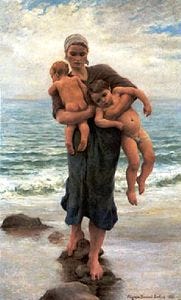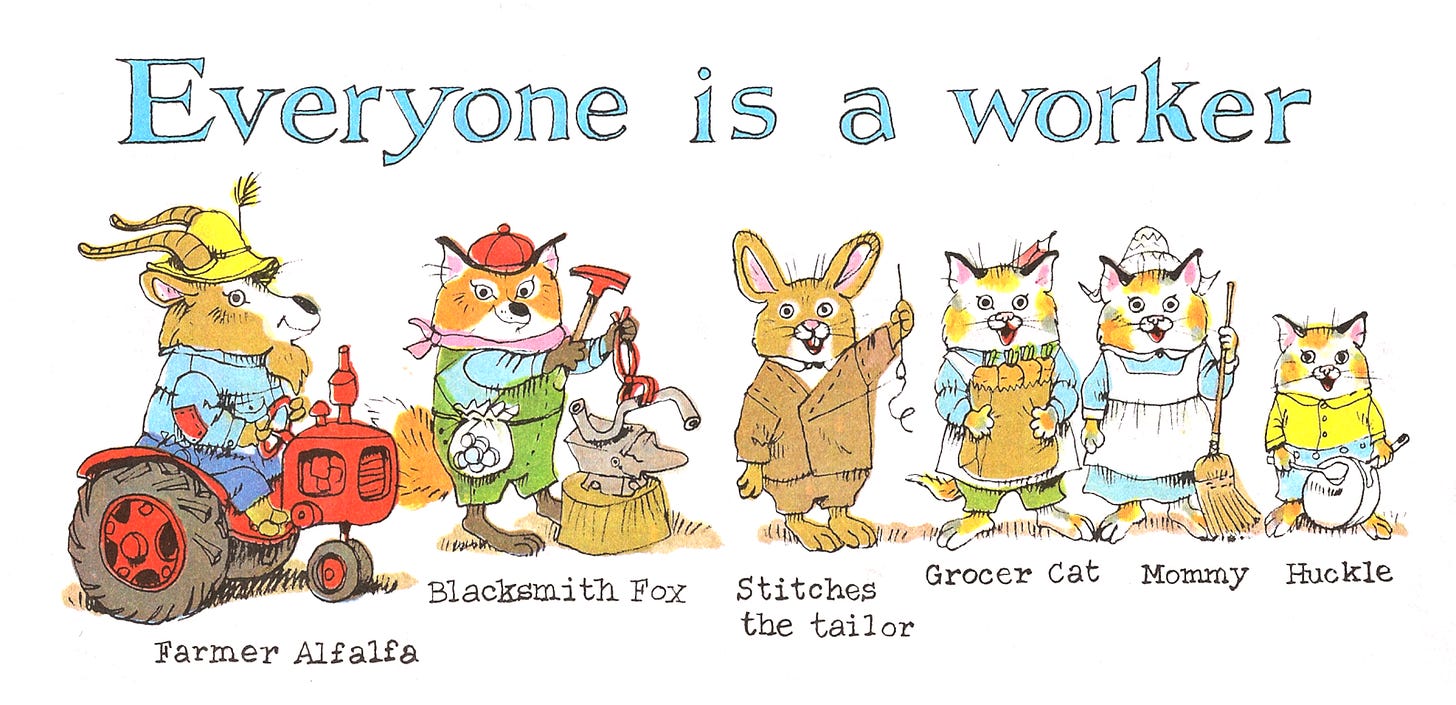I’m a mother, not a “caregiver”
I get why we use that term, but also - maybe let's stop
I’ve put off publishing this post for a few months. Mostly, I’m afraid of hurting feelings or alienating some of my readers. Neither of those possibilities are ultimately my intention here. Instead, I’m hoping this small essay might be a catalyst for an open conversation and a place to share opinions and feelings on this matter. I’ve decided to stay true to myself and share what I think is an important thing to say, here.
I’m not a very “online” person, but I’ve noticed in the last few years an increasing prevalence of stay-at-home mothers using the term “caregiving” in describing what they do. This gives me - as they say - the ick. When I first encountered someone online calling themselves a “caregiver” to their young children at home, I was frankly shocked that someone would use that term to describe their lives. “But it’s an accurate descriptor!” you might say. Well, we’ll get to that below.
Before I unpack why I don’t like the word “caregiver” being used to describe mothering, let’s first look at why this word is maybe used at all in this context.
I think it’s no secret that we live in an adult- and job-oriented culture which does not value the home or the family, including the presence of a loving parent at home with their children. “Stay at home mothers” (SAHMs) are often made to feel marginalized, patronized, condescended to, or at best (or worst) ignored by other adults, which is deeply frustrating and sad. I myself have been on the receiving end of such treatment numerous times by family, friends and strangers. It totally stinks.
It seems to me that the term “caregivers” is most often used to describe themselves by moms who either occupy a concurrent space in spheres of working adults who don’t understand/value the importance of a parent without a traditional job at home, and/or moms who used to work and now no longer do - possibly it is more sense-making for them to quantify their current life by using a euphemistic job title. It’s like the other adults just don’t get what it is we do all day at home without creating an overarching job description they can accessibly relate to.
I’ve included the above Richard Scarry illustration for humor, but also because it’s kinda true. Adults who hold traditional (and non-traditional) jobs AND stay-at-home parents who don’t bring in a monetary income (and those in between) are all workers. I’d venture to say that very few of us are genuinely sitting around doing nothing all day. We perform actions to support ourselves and others in a variety of ways, to varying degrees of physical, emotional and mental exertion. I think most people would agree that the word “work” can be defined in diverse ways - BUT - a lot of those same people would also maybe look down their nose at someone who stays home with their children as being a freeloader. It’s understandable why some moms might want to use “caregiving” to describe what they do at home so as to render it worthy of adult approval. So where does that leave us?
Let’s consider in what context the word “caregiver” is most commonly used to describe a person’s occupation. I don’t usually like to reference *official Internet definitions* to make a point, but I’m including them here to provide a sense of what the general population and culture does in fact consider “caregiving” to be. A quick Google search of “caregiver” links the word primarily to the caretaking of the elderly, mentally ill, infirm or disabled. It is almost always used in the context of a paid position to care for someone unrelated to the caregiver. I scrolled through 15 pages of results and did not see “caregiver” linked once to the care of one’s own small children. Dictionary.com does define caregiver as “1. a person who cares for someone who is sick or disabled” and “2. an adult who cares for an infant or child.” Nowhere did I see “parent caring for their newborn baby” or “mother of small children.” I don’t think I’m splitting hairs to emphasize the lack of familial relationship in either the first or the second dictionary definition. A daycare worker cares for infants and small children - and we all know that a mother and a daycare worker do not even remotely measure equal in the importance and relationship to the child being cared for.
Using the word “caregiver” to describe part of, if not all of what mothers do, is like calling a goat a “grass-eater.” Sure, that’s a lot of what goats do, but is it all of what a goat is? A goat is greater than the sum of its activities. A mother does give care…. But so do grandparents, fathers, and even children themselves. To reduce the vast immeasurable art and practice of stay-at-home motherhood to “caregiving” not only falls far short of the actual description, but it cheapens our interactions down to a nametag or a line on a resume. A “caregiver” feeds baby tigers at the zoo, or works in a nursing home or daycare center. Why would we use this term to describe what we just *do* day in and day out, out of our fundamental purpose as women and love for our children? If a friend texts you at 10:30 am and asks what you’re up to, do you respond “Oh, I’m caregiving today?” (I really hope not…) The term implies that the object of your care is held at arms length - we don’t describe things that are natural proceedings of love in such job-oriented terms. Are African hunter gatherer mothers “caregivers”? Would anyone really even dream of calling them that?
Isn’t taking care of our loved ones what we are supposed to naturally do as humans?
It seems like a transgression against our nature to slap an insufficiently descriptive label reminiscent of a work title in The Giver on the length, breadth, and depth of the motherhood experience. The idea of using the word “caregiver” to describe how we interact with people we are intimately connected to and love strikes me as shockingly but not surprisingly par for the course in our disconnected, self-focused age.1
I have seen adults caring for their aging parents being labeled as “the primary caregiver” of the parent; this seems slightly more permissible given the unfortunate lack of intergenerational relationships and support systems which now characterizes most of the Western world. While being a stay-at-home-parent is seen as a confusing aberration, for an adult to actually physically care for their parent is even more unusual and frankly unimaginable for most people. But it should not be this way.
It should not be that we feel the need to create a label for our natural, human actions in family relationships to make them more understandable or palatable to our fellow adults. We should not have to describe the feeding, washing, teaching, and helping of our family members in need, be they old or young, like we would of conventional employment.
I suppose there are some of you reading this who may agree with me that, yes, it should not have to be this way. But, you may say, it is that way, whether we want it to be or not. And so the label of “caregiver” stands as a rude necessity to help us achieve even the most base of distinctions among our peers and society.
To which I say - let them think what they want.
We mothers know the staggering importance of our place in the home, which cannot be adequately substituted by another person. We know that when our child is crying for mother, no one else will do. We just know that the spoonfuls of baby food, infinite diaper changes, driving to activities, bathroom-scrubbing, and post-dinner dishes we wash are the fruits and visions of our love for our family.
And darn anyone who says it isn’t.
For myself, I will not take my importance as a mother and reduce it to a grossly inadequate job title. Efforts have already been made by society at large to try and reduce our value as the divinely-linked feminine creators and bearers of life down to “birthing people”, and encouraged the abomination of surrogacy. They’ve already tried to euphemize the tragedy of prostitution into “sex work.” They’ve attempted to redefine breastfeeding as “chestfeeding” to psychotically try and include men in what firmly belongs to women. The term “caregiver” as a placeholder for “mothering” hasn’t yet been adopted by the greater populace or news media, but it does not seem far-fetched to me to imagine that it may be in the not-so-distant future.
Let us fight against the attempt to redefine and cheapen what constitutes some of the most meaningful acts we perform as mothers: the care and love of our dearest children and family members.
I’m not a caregiver, you’re not a caregiver - we are mothers.
To be clear, I am not saying that anyone who uses the term “caregiver” to describe their life as a mother is a bad mother, or doesn’t love their children, or dislikes being a mother.






Calling myself a "caregiver" gives me the same ick as calling my husband my "partner".
Wonderful post! I certainly do not identify myself as a caregiver and the word being used to describe SAHMs gives me the ick as well. It sounds totally detached and empty. I am a mother! Thank you for sharing your heart ❤️